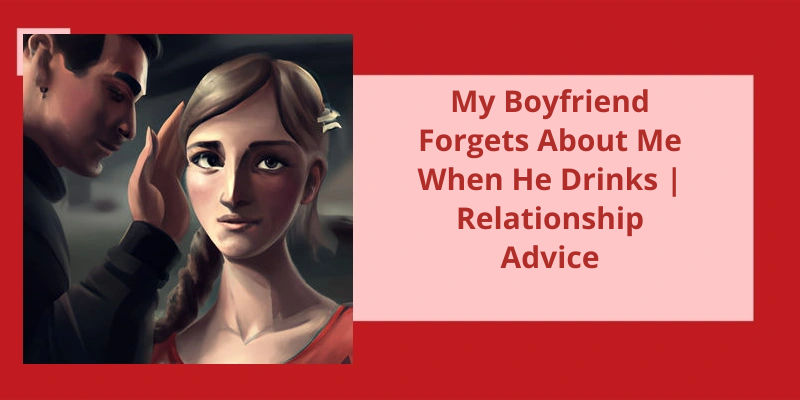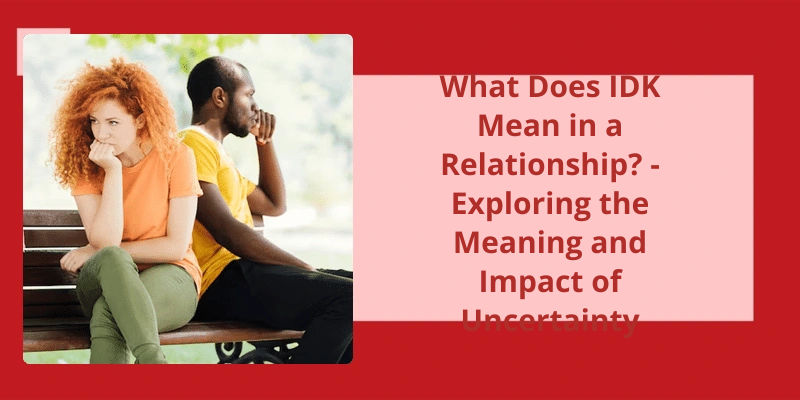It's a common scenario that many people have found themselves in: Your significant other goes out to have a few drinks with friends, and suddenly, they seem to forget that you exist. Whether it's that they don't respond to your texts or calls, or they act differently towards you when they're drunk, it can be incredibly hurtful and frustrating. It's important to understand the reasons behind this behavior and how to address it in a constructive way, so that your relationship doesn't suffer when alcohol is involved. This situation requires empathy, communication, and perhaps even a change in habits to ensure that both partners feel valued and respected.
Why Does My Boyfriend Say Mean Things to Me When He’s Drunk?
However, this behavior isn’t acceptable and shouldn’t be condoned. Verbal abuse isn’t a normal part of the drinking culture, and it’s important to address it. There are a few reasons why someone might become verbally abusive when they’re intoxicated, and it’s essential to understand them to communicate better with your partner.
One common factor is that alcohol lowers inhibitions, which can make someone more likely to say hurtful things. For some people, alcohol can also bring out their repressed emotions and fears, leading them to lash out. Additionally, alcohol can impair judgment and lead to poor decision-making, including saying things that are hurtful and harmful.
It’s also possible that your boyfriend may have underlying emotional issues or trauma that he hasnt addressed. The alcohol may be providing a temporary escape from these problems, but ultimately it will only make things worse. Identifying and addressing these issues can help prevent further verbal abuse in the future.
In some cases, a couples therapy or counseling may be necessary to work through these issues. It’s important to remember that alcohol isn’t an excuse for abusive behavior, and it’s essential to put your safety and well-being first. If you feel unsafe or in danger, it’s important to seek help immediately from a trusted friend or professional.
Remember, you aren’t alone in dealing with this issue, and there’s help available. It takes courage to address these issues, but it’s essential for the health and well-being of both you and your partner. With understanding, empathy, and dedication, you can work through these challenges and build a stronger, healthier relationship.
How to Talk to Your Partner About Their Abusive Behavior When They Are Sober.
- Choose a time when both of you’re calm and not distracted
- Express your concerns about their behavior in a calm and respectful manner
- Use “I” statements to describe how their behavior affects you
- Avoid blaming or accusing language
- Listen to their perspective and validate their feelings
- Encourage them to seek professional help and support
- Establish clear boundaries and consequences if their behavior continues
- Reinforce your commitment to a healthy and respectful relationship
The impact of alcohol on relationships is well documented, but what happens when one person in a relationship drinks while the other abstains? Research suggests that this mismatch in drinking habits can have a negative impact on the quality of the relationship. So, can a relationship work if one person drinks and the other doesn’t? Let’s explore this question further.
Can a Relationship Work if One Person Drinks and the Other Doesn T?
Maintaining a successful, long-term relationship is a complex and challenging task, and many factors can influence the quality of the relationship. One of the most significant factors is shared values and behaviors, including drinking habits. When both partners have similar attitudes towards drinking, it can create a cohesive bond and lead to a healthy relationship.
However, when one person drinks and the other doesnt, it can create tension, frustration, and even conflict between partners. The person who drinks may feel resentful or judged by their partner, while the non-drinker may feel like theyre missing out on crucial shared experiences. This can lead to feelings of dissatisfaction in the relationship and even lead to a break-up.
There are also potential health concerns associated with a mismatch in drinking preferences. For example, if one person drinks heavily, it can lead to health problems, and their partner may be concerned about their well-being. On the flip side, if one person doesn’t drink at all, they may feel uncomfortable or unprepared to handle situations where their partner is drinking heavily.
In some cases, couples may be able to overcome a mismatch in drinking habits through communication and compromise. For example, the person who drinks may be willing to scale back their drinking to make their partner more comfortable, or the non-drinker may be willing to participate in activities that don’t involve alcohol to stay connected to their partner. However, this approach requires both partners to be open and willing to work together.
How Can External Factors, Such as Social Pressure, Affect a Relationship When One Person Drinks and the Other Doesn’t?
- Social pressure from friends or family members who drink
- Misunderstandings or disagreements about alcohol consumption
- Mismatched expectations about behavior or preferences related to drinking
- A lack of communication or understanding about the other person’s beliefs or choices related to alcohol
- Feelings of resentment, guilt, or pressure related to alcohol use
- A perceived or real imbalance of power or influence in the relationship related to drinking
- A perceived or real impact on the quality or stability of the relationship due to alcohol use
- A shift in values or priorities related to alcohol and social activities
Source: Researchers Show Alcohol Can Impact How Happy Couples …
Navigating a romantic relationship is never an easy feat, but when one person chooses to live a sober lifestyle and the other person enjoys the occasional drink, it can present some unique challenges. However, with dedication and open communication, it’s possible for these two individuals to make it work. In fact, the sober partner may even have an advantage in the relationship. Let’s take a closer look.
Can a Sober Person Date Someone Who Drinks?
Unlike the drinker, they’re less likely to engage in impulsive behavior, which can cause tension in the relationship. Additionally, they may be more mindful of their actions and words, which can help prevent misunderstandings, and minimize the risk of saying something hurtful. Furthermore, the sober partner may be more understanding and supportive of the drinkers struggles, without enabling their behavior. They can provide a healthy perspective, and encourage the drinker to seek help if needed.
Communication is key in any relationship, but particularly important in a relationship where one partner is sober and the other drinks. The sober partner should express their boundaries and expectations clearly, and the drinker should respect them. They should also be open and honest about their feelings and concerns, and listen actively to each others perspectives. It’s okay to have different opinions and beliefs, as long as they’re respectful and considerate of each others well-being.
It’s also important to have a plan for social situations where alcohol is present. The sober partner should be prepared to discuss their decision to abstain from drinking, without being defensive. The drinker should be respectful of their partners choice, and not pressure them to drink. They should also have a plan for how to support each other if one person experiences cravings or triggers. This may include leaving the event early, or finding alternative activities that don’t involve alcohol.
It’s not uncommon to find yourself in a relationship with someone who drinks more than you. It can be a source of tension and concern, but it’s important to know how to approach the situation in a constructive way. If a loved one is struggling with alcohol misuse or use disorder, it can also be a difficult and stressful experience. Here are some steps that can help you offer support and care for your partner or friend.
What to Do if Your Partner Drinks More Than You?
If you’ve a partner who drinks more than you, it can be a tricky situation to navigate. While you might love and care for them deeply, their drinking habits can impact your relationship and your own personal wellbeing. It’s important to have a conversation with your partner about your concerns, but it’s best to do so when theyre sober. This will allow for a more productive and thoughtful dialogue.
When you do approach your partner, it’s essential to be non-confrontational and non-judgmental. Use “I” statements to express how their behavior makes you feel and how it affects your own habits. It’s important to make it clear that youre coming from a place of love and concern, rather than criticism or blame.
In addition to having a conversation, it’s also helpful to offer alternative activities that don’t involve alcohol. If your partner enjoys going out to bars or drinking at home, suggest other ways to spend time together that don’t revolve around drinking. This could include taking a hike, trying a new restaurant, or exploring a new hobby together. By doing so, youre also providing a healthy outlet for your partner that doesn’t involve excessive drinking.
Remember, it can be challenging to support a partner who struggles with alcohol misuse or use disorder. It’s important to take care of yourself and seek out additional resources and support, such as therapy or support groups. Taking care of your own mental health will allow you to better support your partner and maintain a healthy relationship. Ultimately, it’s up to your partner to seek help and make a change, but you can play an important role in supporting them along the way.
How to Recognize Signs of Alcohol Misuse or Use Disorder in Your Partner
Recognizing signs of alcohol misuse or use disorder in your partner can be tricky, but there are some warning signs to look out for such as problems with work or school, neglecting responsibilities, changes in mood, and secrecy around alcohol consumption. It’s important to have an open and honest conversation with your partner about your concerns and encourage them to seek help if necessary.
When it comes to dating someone who doesn’t drink, there are some additional considerations to keep in mind. It’s important to be respectful and supportive of their choice, while also finding ways to make them feel comfortable in social situations. Here are six tips to help you build a healthy and happy relationship with someone who doesn’t drink.
How Do You Have a Relationship With Someone Who Doesn’t Drink?
Having a relationship with someone who doesn’t drink can be a challenging experience, especially if you’re an avid social drinker. The thought of spending time with someone who doesn’t partake in alcoholic beverages may leave you feeling confused about what to do or how to act.
One way to help a date who doesn’t drink feel more comfortable is to plan dates at creative locations. There are many entertaining activities that don’t involve alcohol, such as an escape room game or a movie night. Explore your citys unique culture by checking out a museum or going on a hike. These activities allow you to create opportunities for bonding, without feeling pressured to drink.
Another way to make a non-drinking date feel accepted is to show an interest in their choice, and respect them for it. There are many reasons why someone might not drink, such as religious or personal beliefs or health concerns. Take the time to understand their point of view and learn more about what they enjoy doing. This can help you both feel more connected and more understanding of each other.
Planning ahead for your nights out can also make a big difference. Call ahead of time to see if the restaurant or bar offers non-alcoholic options, or scout out the menu in advance to make sure your date has a good selection of non-alcohol options. Doing so shows that you’re considerate of their needs and are only interested in having a good time, without the need for alcohol.
It’s important to avoid projecting your life onto the person who doesn’t drink. It’s possible that you’ve a lot of friends or activities that involve alcohol, and you shouldnt feel obligated to sacrifice your social life. However, it’s important to recognize that your date may feel uncomfortable in such situations. Try to find a balance that allows you both to still have fun and feel comfortable.
Lastly, it’s important not to focus on the fact that your date isnt drinking. While it may feel like an elephant in the room initially, it’s important not to make a big deal out of it. Instead, focus on getting to know each other and having a good time – this is ultimately the reason why youre going out in the first place. By following these tips, you can build a healthy, meaningful relationship with someone who doesn’t drink, creating great memories along the way.
How to Communicate With Friends and Family About Your Partner’s Choice Not to Drink
- Be honest with your friends and family about your partner’s choice not to drink
- Explain the reasons behind your partner’s decision to refrain from drinking
- Encourage your friends and family to respect your partner’s choice and not pressure them to drink
- Suggest alternative activities that don’t involve drinking, such as going to a movie or having a game night
- Remind your friends and family that your partner’s choice not to drink doesn’t change who they’re as a person
- Answer any questions they may have and try to have an open and respectful conversation about the topic
- Ultimately, it’s important to support your partner’s decision and stand by them, even if others don’t understand or agree with it
Conclusion
In conclusion, dealing with a partner who forgets about their significant other when drinking can be difficult and emotionally challenging. While it may be tempting to ignore the behavior or brush it off as a one-time occurrence, it's important to have open and honest communication about the impact it’s on the relationship. Seeking support from friends or a therapist can also help in navigating these difficult conversations and finding healthy ways to cope with the situation. Ultimately, it's up to both partners to address the issue and work towards a solution that prioritizes mutual respect and care.






